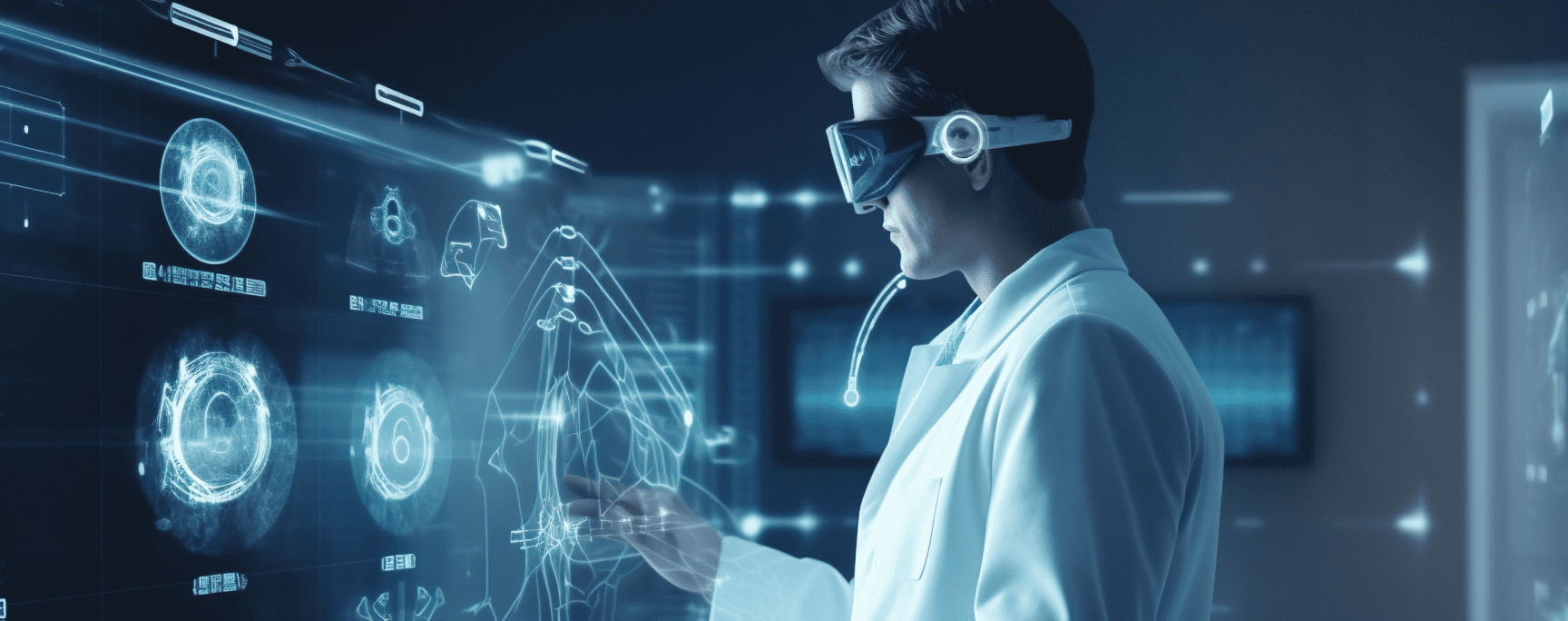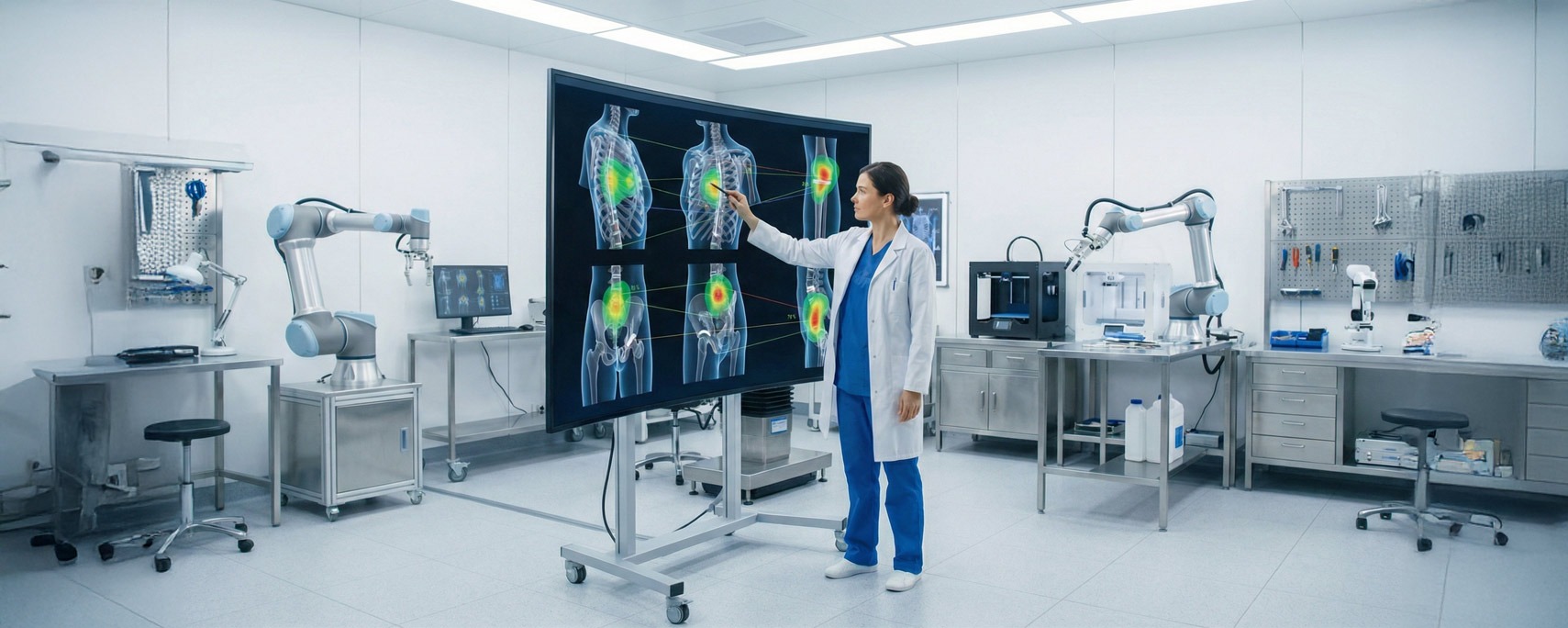The Potential of Artificial Intelligence in Healthcare Industry
Introduction
AI has revolutionized the world with technologies like deep learning and machine learning. It has transformed all industries, including healthcare. The benefits of AI in healthcare are clear. They include speeding up drug discovery. It cuts the time and cost of developing new treatments. They also enable personalized care. It creates treatment plans that improve patient outcomes. These innovations are improving healthcare. They are making it more efficient and accessible.
AI systems can analyze vast medical data with high accuracy. They help healthcare experts find disease patterns much earlier. An Accenture report says that, by 2026, the combined use of key clinical health AI applications could result in $150 billion in yearly savings for the US healthcare industry.
Let’s explore healthcare advancements in-depth. This blog will help you understand the types, benefits, drawbacks, and roadblocks of integrating AI in healthcare. Let’s get started!
How is AI shaping the Future of the Healthcare Industry?
AI is reshaping healthcare by revolutionizing patient care delivery and provider’s efficiency. AI, along with telemedicine, EMR, and big data, improves the whole industry. It boosts patient outcomes and streamlines processes. Let’s discuss how AI has transformed the way the healthcare industry operates.
- Virtual Health Assistants and Chatbots
AI is improving patient-provider communication in healthcare. It’s now smoother, faster, and more efficient. Telemedicine lets patients have virtual doctor visits with AI to confirm diagnoses. AI chatbots handle appointment scheduling, health advice, and patient inquiries. They also provide instant responses. AI has helped patients by sending health alerts. These include reminders about medications and appointments. AI also helps patients stay on track. This healthcare innovation saves time for both patients and healthcare professionals. - Digital Medical Record
Digital medical records save a person’s health history in a digital format. They end the days of hefty files and tattered papers. The summary may include lab results, diagnoses, surgeries, and prescriptions. It may also include information about hospital stays. Better health insights from electronic medical data can improve care. They can lead to more precise diagnoses and better patient care.Transforming Your Ideas into Action.
We’re here to help turn your vision into reality, step by step.
Contact Our Experts! - Big Data
Medical accountants can gather enormous amounts of data by utilizing healthcare technology. Data collection can help healthcare practitioners learn about new methods and trends.
- Disease Detection and Diagnosis
AI algorithms analyze medical images and patient data to detect diseases with greater accuracy. From identifying early-stage cancer in imaging scans to diagnosing rare conditions, AI enhances precision and reduces diagnostic errors.
- Remote Monitoring and Telemedicine
AI-enabled devices monitor patients in real-time, offering actionable insights to healthcare providers. This facilitates remote care, especially for chronic conditions, improving outcomes while reducing hospital visits.
Benefits of AI in Healthcare: Pros and Cons Explored
AI is changing healthcare technology. It makes diagnoses better, improves patient care, and lowers costs. Yet, there are challenges. These include privacy issues, too much reliance on technology, and less personal contact. We must balance the drawbacks and benefits for healthcare to move forward.

Top 7 Applications of AI in Healthcare
AI is revolutionizing the healthcare sector by advancing diagnostics, treatments, and patient care. It enhances medical imaging, enabling faster and more accurate disease detection. AI also facilitates personalized treatment plans tailored to individual patient needs. By automating routine tasks, it boosts efficiency, improves outcomes, and elevates patient satisfaction.
The benefits of AI in healthcare include enhanced precision, faster diagnoses, and more efficient care delivery, leading to better patient experiences. A report from Acumen Research says the global AI in healthcare market will reach $8 billion by 2026. This shows its growing role in the future of healthcare.
-
Medical Imaging
Using ML in healthcare, algorithms may analyze medical images. These include X-rays, MRIs, and CT scans. The goal is to help radiologists better identify anomalies. Furthermore, it can aid in the timely identification of illnesses like cancer.
-
Drug Discovery
ML in healthcare can help find potential drug candidates. It does this by analyzing large databases of bioactive molecules. It predicts their ability to cure diseases.
-
Personalized Treatment
AI can assist in developing personalized treatment recommendations for individuals based on health history, genetic makeup, and lifestyle choices, which lead to improved outcomes.

- Electronic Health Records (EHRs)
AI improves EHR analysis by finding patterns in patient data. This helps doctors make accurate diagnoses and spot health risks early. Knowing a patient’s history improves decisions and care quality. - VNA (Virtual Nursing Assistant)
They help patients with chronic diseases. They remind them to take meds, exercise, and attend appointments. Such reminders ensure better adherence to treatment plans. With constant support, patients can manage their condition with greater effectiveness. Such proactive care enhances health outcomes. - Predictive Analysis
AI can assess a patient’s risk of critical diseases. This allows for early diagnosis and timely intervention. AI helps install preventive measures before a condition gets worse. This method improves health outcomes by focusing on early prevention. - Surgical Precision
AI-integrated robots assist surgeons by providing real-time data and images during operations. This technological advancement helps improve accuracy and precise movements. Enabling rapid decision-making and enhancing surgical outcomes.
Key Challenges to AI Adoption in the Healthcare Industry
AI has the potential to transform healthcare, but challenges hinder its widespread adoption. Addressing these obstacles is crucial to unlocking AI’s full potential in improving patient care.
- Lack of Standardization
A major obstacle to using AI in healthcare is the lack of standards. There are no accepted guidelines for using AI in healthcare. This inconsistency can create challenges for patients and providers. - Limited Data
Healthcare organizations have been implementing AI to enhance patient care and outcomes. Yet, a significant challenge remains the lack of comprehensive data. Limited data presents a major obstacle. It hinders this effort. Training AI models is hard. They segregate health data, making it inaccessible. - Integration with Legacy Systems
Integrating AI with legacy systems is one of the difficulties in applying it to healthcare. Most legacy systems use antiquated technology that does not suit more modern ones. Data interchange between these systems required for AI applications may be challenging as a result. - High Implementation and Maintenance Costs
Another issue with implementing AI is its high cost across the board. Although AI has a wide range of potential applications in the healthcare industry, the high expenses associated with its development and deployment continue to be a major obstacle to its wide acceptance. - Regulatory and Compliance
The U.S. healthcare sector has strict regulations. Thus, AI applications must follow these rules. A major challenge is protecting patient data privacy and security, especially under HIPAA. Also, AI in healthcare must meet FDA standards and the 21st Century Cures Act. The Act promotes health IT compatibility. These regulations, along with legal and ethical standards, complicate AI use in healthcare. But they are vital for ensuring patient safety and privacy.
Conclusion
The benefits of AI in healthcare are undeniable. Its power enhances diagnostics, improves care, and streamlines operations. AI in healthcare can improve patient outcomes and efficiency. It can personalize care, making it timely and affordable. But it also brings challenges like privacy issues, integration problems, and regulatory barriers. These need careful attention.
AI has the potential to transform the healthcare sector. Yet, we must consider risks such as privacy, security, and reliance on technology. The ethical and responsible use of AI is vital. We need to weigh both the pros and cons to keep patients safe.
Contact us today to learn more about our services and how we can help your business succeed.
About Dash

Dash Technologies Inc.
We’re technology experts with a passion for bringing concepts to life. By leveraging a unique, consultative process and an agile development approach, we translate business challenges into technology solutions Get in touch.







